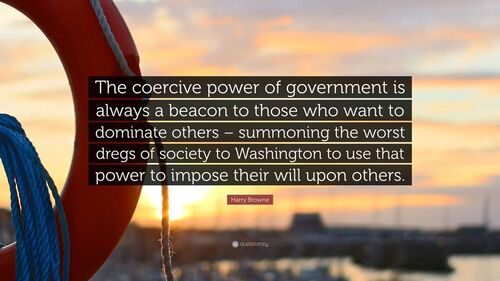Current events prove why Americans should never trust ‘government’ – Any government!
03/13/2022 / By News Editors

All governments are based on the “strongest gang” principle. Think about it. In order to exercise power, a government must be stronger than any who would oppose it. If it is not, it is open to revolution. A second point is that governments are, at best, symbiotic, and at worst, parasitic on a population.
(Article by David Robb republished from AllNewsPipeline.com)
Some governments are relatively benign and exercise only modest power. These governments provoke little opposition as people under them usually have better and more productive things to do with their time. Matt Ridley points out that innovation flourishes under freedom – a sure indication that people have more fun things to do than to fight against oppression.
Tyrannical governments usually engender powerful opposition The tighter they try to clamp down, the more restrictive they become, the more appealing, and even necessary they make resistance. We have seen that worldwide today in response to the lockdown and other restrictions imposed by formerly free and democratic governments.
How governments start
We don’t really know how the first governments started or why, although we can make some educated guesses. Picture primitive tribes operating in the same territory. Sooner or later they would come into conflict over hunting or foraging activities. One group might learn that organizing under a single leader would make them more effective in attacking and chasing off other groups.
Another tribe might select some of their members to be on guard to respond to attacks. The defenders could be given food and other items to compensate them for the time they lost from hunting and gathering. Some of the defenders might learn that they could apply the same skills they developed defending the tribe in demanding things from their fellow tribesmen.
In either case, before too long, you have a division developing where there is one group that not only has the power to defend the tribe, but also has the power to demand what they want from other tribe members. Since they are the strongest gang within the society, no one can oppose them effectively.
Some gangs would learn to limit their demands as too much control becomes counterproductive. Others learned the advantages of division of labor and the benefits of repressing uncooperative elements.

All the colors of power
As time went on, the tribes became larger and larger. People began to sort out what worked and what didn’t when it came to use of power in a society. As societies became more complex, there was greater division of labor and specialization. A growing need for coordination of activities was present in addition to the original need for defense. There also grew a need for a consistent set of rules for people to follow, as well as a system to adjudicate disputes.
Along the way, people started to realize a few points about government and what distinguished good ones from bad. The good ones tended to be effective at certain basic tasks such as defense, while placing minimal demands on the behavior of citizens. Others severely constrained their populace and hemmed them about with arbitrary rules. Some provided honest and fair laws and systems of justice, while others were arbitrary, whimsical, and inconsistent.
In the course of history, many different systems of government have been tried. Some have even tried to do away with government entirely, relying on cooperation between members. These latter ones rely heavily on trust which limits them in size and generally they have failed quickly.
Alexander of Macedon assembled a large and powerful gang, and proceeded to conquer most of the known world at the time. Since his government was based solely on raw exercise of power, it fell apart as soon as his death was known. Another ancient of about the same period, Plato, took an opposite tack and proposed a system of government he thought ideal and left it to others to implement.
The ancient city of Athens was an early experiment in democracy, where power was allotted to those chosen by vote of citizens. Its history has informed ideas of good governance for thousands of years. A contemporary city and rival to Athens was Sparta.
Sparta was organized as a militaristic society – essentially organized along the strongest gang principle. Although Sparta defeated Athens in the Peloponnesian War, it had little influence on Western theories of good governance. Sparta was ultimately defeated by Rome, which was, at the time, the strongest gang in the region. The history of Rome is fascinating in itself as its various forms of government changed when different groups (gangs) acquired or lost power. One of Rome’s most significant contributions to the theory of governance was the delegation of power to provincial governors. In other words, a local gang could call on the power of a bigger gang if the locals got too uppity.
Having, by now, offended a great number of historians, I will proceed to look at what all these systems of governance had in common – a common element that led to the failure of each and every one of them.
A worm in every apple
The one factor that all these governments had in common, and which is common in modern governments as well is the desire for ever increasing power. No matter how much power a government might have, it will never be satisfied and will always seek more.
Let me repeat – a government, unless it is curbed in some way, will always seek to increase its power.
The two most popular ways to curb the increase of power is through rebellion from within, or by conquest from without. I doubt there is any example of a government that relinquished any of its power voluntarily. In large part, this is due to something I might call Newton’s law of political action, where for every amount of political force a government might exert, an equal and opposite resistance will arise to oppose it.
When a government relinquishes power, the opposing force has an opportunity to take over, resulting in a rebellion. Indeed, government giving up some of its power may be due to a strong resistance just short of revolution.
The growth and decline of the British Empire illustrate this process. Starting in the late 16th century with early trading and colonies, more power, especially in the form of naval power, was needed to protect trade from pirates (local gangs) and other depredations. The increases in power led to the acquisition of more territories, which led in turn to the need for increased power, until the entire edifice spanned the globe. At the height of its power, it was said that the sun never set on the British Empire. When asked why that was so, one wag responded: “Because God wouldn’t trust it in the dark”.
Reflection on this history led John Emerich Edward Dalberg Acton, first Baron Acton (1834–1902) to offer his famous quote: “Power tends to corrupt, and absolute power corrupts absolutely. Great men are almost always bad men.”
It was from this Empire that the United States rebelled. There were several factors at work that made our rebellion different from most other revolutions in history. Unlike previous rebellions that simply sought freedom from the rule of an oppressive government, the American Revolution not only sought freedom but also had a philosophical underpinning that sought to create a new system of governance where the people would form their own government. They would create their own “strongest gang” and create systems that would provide automatic curbs on the growth of power.

An exceptional America
For well over a hundred years, there had been an extensive discussion throughout the Western world about the nature, purpose, and philosophy of government. It was recognized that governments served certain important, and even essential functions. Defense was paramount. Providing a system of laws and a system to administrate the laws was also essential. It was further recognized that it was the duty of a government to protect and maximize the rights and freedoms of its citizens.
As part of the discussions on government, there was an extended discussion on the concept of rights. The idea of a right was distinguished from that of a permission. A right was recognized as something inherent in the simple existence of a citizen and was something that a government was obligated to recognize and respect. By contrast, a permission was something granted by an authority, such as a government, and could be revoked at will. In other words, a right did not require permission to exercise, while permissions were subject to authority sponsorship.
One of the innovations of the Founders was to recognize that our most basic rights were inherent in our human existence. This recognition grew out of the Christian heritage of the Founders, and was explicitly stated in the Declaration of Independence as “… that they are endowed by their Creator with certain unalienable Rights, that among these are Life, Liberty and the pursuit of Happiness”. Recognizing that rights were from God removed them from the province of human origin and control.
Our Founders were well educated in the Classical histories of Greece and Rome, of the Renaissance and the Reformation. They were keen followers of the debates on government, and even participated in those debates. They lived in the full flower of the Age of Enlightenment. Many of them were avid readers of Locke, Hume, Voltaire, Rousseau, Adam Smith, and many other authors of the Enlightenment. Thomas Jefferson and James Madison were deeply influenced by these Enlightenment ideas and incorporated many of them in our own Constitution. A simple review of the catalog of the contents of Thomas Jefferson’s library is enlightening, but he was far from alone in his studies.
As a group, our Founding Fathers were unique in world history for the depth of their knowledge regarding the history and philosophy of government. It is doubtful that any similar group with such knowledge could be assembled today. From that knowledge and understanding our Founders realized two things: a certain amount of government was necessary to perform basic essential functions, and that measures were necessary to keep that government from growing out of control. Thus they had to confront the paradox of creating a government that was strong enough to overcome any normal resistance while being sufficiently weak that it could be overcome should it overstep its bounds.
On the horns of a dilemma
Thinking of government, for a moment, in biological terms, one can consider the case of two organisms having mutual dependence. In symbiosis, neither organism can live alone. Both require something from the other in order to survive. Examples of symbiosis abound, ranging from the simple case of lichens to higher organisms like cows that depend on gut bacteria to digest the grass they eat while the bacteria depend on the cow to harvest the grass. A good government exists in symbiotic relationship with its citizens, both providing benefit to the other without harmful side effects.
In some cases, though, a parasitic relationship develops where one organism lives and grows at the expense of another. A tapeworm is a classic example, where the worm grows in the gut, intercepts food the organism consumes and grows to the point where the host suffers. The relationship may have started in some benign form, but has progressed to the point where only one organism benefits from the relationship.
Governments can exist in parasitic relationship to their populace. We call these governments tyrannies, dictatorships, autocracies, Socialism, and other names, but all share the common feature that the government has grown so powerful that it operates at the expense of its people. As with biological parasites, a parasitic government may begin as a benign entity, but through unchecked acquisition of power grows to oppressive size.
The solution to the paradox that our Founders implemented was in the checks and balances set forth in our Constitution, and especially in the first two of our Bill of Rights.
Read more at: AllNewsPipeline.com
Submit a correction >>
Tagged Under:
authoritarian, freedom, government, Liberty, lunatics, obey, politics, sheeple, trust, Twisted, Tyranny
This article may contain statements that reflect the opinion of the author
RECENT NEWS & ARTICLES
COPYRIGHT © 2017 CONSPIRACY NEWS




















